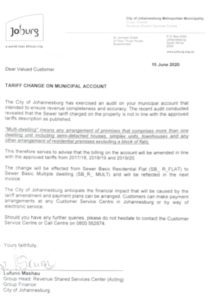
Written By Chantelle Gladwin-Wood, Partner; Lauren Squier, Associate; and Kirsten Chetty, Associate
Introduction
The City of Johannesburg (“COJ”) has advised many sectional title body corporates that it has or will adjusted their municipal accounts to “change the sewer tariff from ‘block of flat’s’ to ‘multi-dwelling’”. In several cases that we have seen this has resulted in these body corporates being charged several hundred thousand rand of backdated charges, for the financial years of 2017/2018, 2018/2019 and 2019/2020. This article considers the lawfulness of this action.
What is a sewer tariff?
COJ charges property owners for sewer based on its tariff for sewer (or effluent) charges, which is updated each financial year. This tariff sets out the charges payable by different types of property owners, for sewer. A tariff is a price list, based on categories of properties, with descriptions of what kinds of properties are supposed to fit into each category. The price paid for sewer thus depends on the category that you fit into.
Applying for a Change of Tariff
There are two ways that you might find that a ‘change of tariff’ has occurred. The first is where the property owner detects that he has been placed by the City into the wrong category, and requests a change based on this. The tariffs provide that an owner may request a change, and that, if this happens, the owner will only be entitled to be charged on the new tariff after application for same is made.
In effect, the City prohibits retrospective (backdated) application of the new tariff to any period prior to application for a change of tariff. This is even if the City made the mistake in the first place and wrongly billed the customer. In the view of the authors, this prohibition on a retrospective application of the correct tariff is potentially challengeable in court on the basis that the City cannot escape its obligations to correctly charge its customers by including a clause in its tariffs that is interpreted to preclude the retrospective correction of charges previously mistakenly billed.
This kind of tariff change takes place when both parties agree that the tariff ought to be changed. The City agrees to the change upon application of the owner. If the City doesn’t agree to the change, it doesn’t happen. If the owner is unhappy about this, they can institute legal proceedings to compel a change of tariff, if this is lawful.
Unilateral ‘change of tariff’
This occurs where the City decides, on its own and without reference to the owner, that it is going to change the customer’s tariff, for some or other reason. This is what is happening to the body corporates referenced in the introductory paragraphs of this article. This kind of change is only lawful if the City has followed the provisions of the Promotion of Administrative Justice Act (“PAJA”), which requires that a municipality that is going to make a decision that will materially and adversely affect a customer (such as a decision to change their tariff, which will cost them more money) must first notify the customer of the proposed decision and give them an opportunity to make representations before implementing that decision. The City’s failure to have followed this process will render the decision procedurally unfair in terms of PAJA and such a decision is liable to be reviewed and set aside by a court.
It’s not quite as simple, however, as rushing off to court to have the change of tariff set aside on this basis if the proper procedure wasn’t followed. If the City had a lawful reason for changing the tariff, then it can still go ahead and change the tariff after following the correct procedure. So a review application is not necessarily going to solve all of your problems if your only reason for bringing it is to have the charges set aside on a procedural irregularity.
‘Block of flats’ v ‘Multi-dwelling’?
One must also look at whether the change of tariff was substantively lawful. Ignoring the procedural aspects of the change for the moment, we need to ask whether the City had any right at all to change the tariff as it did. The starting point is the City’s tariffs. If they clearly describe the two types of tariffs (namely block of flats and multi-dwelling) for each year in question, and it is clear that the property in question fell into the multi-dwelling category and not the block of flats category, then that would be the end of the matter, because it would be lawful for the City to enforce the change, provided that it had followed the procedure set out in PAJA to give effect to the customer’s procedural and administrative law rights before making the change.
But, as above, it is not quite that simple, because the City’s tariffs over the years have changed from one year to the next, and the wording of the relevant provisions are, to be kind, less than perfect. For example, the City’s 2017/2018 tariffs do not even contain a sewer tariff that applies directly to blocks of flats – although its 2018/2019 tariffs do. Yet the City is advising customers, in writing, that it is changing the customer’s tariff from block of flats to multi-dwelling for this year. The generic notice that the City is sending its affected customers saying as much is included at the end of this article, for public benefit.
Another interesting twist in the tale is that the City has changed the definition of block of flats from one year to the next, and in some of the years it has excluded flats valued at over R700,000 each from the definition. This means that, for those years only, the property owner would have to pay sewer charges on the units at the property based on the more expensive multi-dwelling tariff, because they don’t qualify to pay sewer charges at the lower block of flats tariff. This exclusion, however, is not consistent – it appears in the 2019/2020 tariffs but, as far as we can see, it does not appear in the 2020/2021 tariffs. We caution, however, that there are several versions of the ‘final 2020/2021 tariff’ floating around on the internet, and it is not yet clear which version (the one with the R700k exclusion, or the one without it) is actually the correct version.
A third complicating feature is that many sectional title schemes are built as a block of flats, with one communal entrance and one condominal sewer. They would thus qualify as a ‘block of flats’ if they meet this description and are not excluded by the R700k exclusion referred to above. Conversely, a block of flats is, by general definition, a multi-dwelling property, because it consists of multiple dwelling units. The COJ’s sewer tariff categories are badly defined and make it difficult for customers to know which category they fit into.
We have seen several cases in which the City has assumed, without checking, that sectional title body corporates are multi-dwelling properties (meaning simplex or duplex type properties) when they are actually a block of flats. This assumption on the City’s part is irrational and irresponsible. If the City had bothered to check the actual arrangement of buildings at the property, it wouldn’t have wrongly changed the customer’s tariff. Additionally if it had followed lawful procedure to change the tariff, by notifying the customer and giving the customer an opportunity to make representations, the City would have been alerted to the error and would not have carried through with the unlawful change of tariff. Sadly, the City seems not to have bothered to do either in some cases.
Is it lawful to backdate a Change of Tariff?
Assuming that the City has correctly identified a sectional title body corporate that is built in a simplex/duplex arrangement, and it has confirmed that the body corporate was actually wrongly billed in prior years as a block of flats, is it lawful to backdate the change of tariff for three years?
There are two legal issues at play here. The first is whether it is lawful for the City to be allowed to correct a mistake by changing a tariff with retrospective application, when it does not make that option available to customers. Above we explain that the City’s tariffs preclude customers from getting the benefit of a tariff change retrospectively. How can it be fair for the City to stop a customer getting its tariff corrected retrospectively yet reserve that right to itself? Our legal opinion is, as above, that the City’s attempt to stop customers from being able to retrospectively fix a billing error by changing its tariff is not lawful and cannot be enforced, as this would entitle the City to benefit from its own wrongdoing. Our view is that the City is lawfully entitled to go back and change the tariff, but that customers are also entitled to do the same, subject to prescription.
Prescription
The second legal issue that needs to be considered is prescription. The law provides that certain debts are too old to sue for and have “prescribed”. Tax debts only prescribe after 30 years, and sewer charges are considered to be taxes. Therefore, hypothetically, the City can retrospectively change a sewer tariff for 30 years – if, of course, it is correct on its facts and the property does actually fit into the category that it assumes it does, and if the City’s tariffs over those past periods of time do actually provide that the customer concerned should have been in a different tariff category.
Billing Issues
Even if the City is lawfully entitled to change a tariff and apply it retrospectively, it is still bound to charge customers correctly when it comes to the debits and credits passed on the account. In several cases, we have seen that the City’s accounting leaves a lot to be desired and simple debit/credit line items are incorrect, which result in an incorrect billing.
Understanding a COJ invoice can be challenging at the best of times, and the manner in which the COJ is invoicing for these “changes of tariff” is especially confusing. The notations on the invoice give the customer no indication at all of what the charges billed and reversed are, or how they are calculated. It is only through years of experience that we are able to understand the City’s methodology and reverse engineer the lump sum charges to understand what the City is attempting to do in the invoice in which the “change of tariff” charges are passed. Typically, the City charges 4 – 5 large debits, and passes 3 – 4 credits, in the same invoice, with relatively similar descriptions such as “Residential sewer credit” or some other similar notation. If you require assistance in understanding whether you have been billed correctly, you might need to consult a specialist if you are unable to obtain this information from the City.
Conclusion
Although the City is lawfully entitled to correct a billing error, the manner in which it does this, is important, as is the manner in which it carries out the correction of the invoice. If you require assistance in understanding whether you have been billed correctly, you might need to consult a specialist if you are unable to obtain this information from the City.


